Samsung Onyx LED screens bring vibrant visuals and immersive experiences to Paris' iconic Pathé Palace, blending historic ambiance with innovation.
The post Samsung Onyx LED Screens Redefine Cinema at Pathé Palace first appeared on Trendy Gadget.
Samsung Onyx LED screens bring vibrant visuals and immersive experiences to Paris' iconic Pathé Palace, blending historic ambiance with innovation.
The post Samsung Onyx LED Screens Redefine Cinema at Pathé Palace first appeared on Trendy Gadget.
Temu is the latest platform the European Commission (EC) has fixed its regulatory gaze upon. Europe’s top consumer enforcement authority said Thursday it’s opening a formal investigation into the online retailer for enabling the sale of illegal products, including limiting the reappearance of previously suspended “rogue traders” with a history of hawking prohibited goods.
In addition to the illegal product allegation, the EC is also investigating Temu’s potentially addictive design, the platform’s systems that recommend products and data access for researchers. The alleged violations fall under the Digital Services Act (DSA), which empowers the EC to levy fines of up to six percent of Temu’s annual revenue.
In a statement to Engadget, a company spokesperson said it plans to cooperate fully. “Temu takes its obligations under the DSA seriously, continuously investing to strengthen our compliance system and safeguard consumer interests on our platform,” the Temu spokesperson wrote. “We will cooperate fully with regulators to support our shared goal of a safe, trusted marketplace for consumers.”
Temu added that it’s in discussions to join the “Memorandum of Understanding (MoU) on the sale of counterfeit goods on the internet,” a collective of online retailers (facilitated by the EC) that collaborates to prevent fake product sales in Europe. “We can confirm that we are in discussions to join the initiative,” the Temu spokesperson told Engadget. “Counterfeiting is an industrywide challenge, and we believe that collaborative efforts are essential to advancing our shared goals of protecting consumers and rights holders.”
The EC’s formal proceedings follow a preliminary risk assessment report Temu provided the EU at the end of September, its replies to the Commission’s formal requests in June and October and info shared by third parties. As Bloomberg notes, Meta, X, AliExpress and TikTok are also facing DSA investigations.
The US, which typically lags far behind the EU in reining in Big Tech, said in September it may investigate Temu, too. Leaders of The Consumer Product Safety Commission (CPSC) ordered staff to evaluate concerns about “deadly baby and toddler products” on the platform.
Among the EC’s concerns are whether Temu’s systems are designed to prevent the reappearance of previously suspended traders and non-compliant products. It will also look at the platform’s potentially addictive gamified reward programs and its systems to mitigate the risks from addictive design choices that could harm customers’ mental well-being. It will investigate Temu’s parameters used to recommend goods (the Commission wants at least one “easily accessible option that is not based on profiling”) and whether the company complies with the DSA’s requirement to provide researchers with publicly accessible data.
The EC doesn’t set legal deadline for completing DSA investigations. Once concluded, the Commission will decide whether to bring the hammer down, accept voluntary commitments to remedy the problems or drop the case.
This article originally appeared on Engadget at https://www.engadget.com/big-tech/european-commission-sets-its-regulatory-crosshairs-on-temu-for-illegal-product-sales-164541327.html?src=rssTemu is the latest platform the European Commission (EC) has fixed its regulatory gaze upon. Europe’s top consumer enforcement authority said Thursday it’s opening a formal investigation into the online retailer for enabling the sale of illegal products, including limiting the reappearance of previously suspended “rogue traders” with a history of hawking prohibited goods.
In addition to the illegal product allegation, the EC is also investigating Temu’s potentially addictive design, the platform’s systems that recommend products and data access for researchers. The alleged violations fall under the Digital Services Act (DSA), which empowers the EC to levy fines of up to six percent of Temu’s annual revenue.
In a statement to Engadget, a company spokesperson said it plans to cooperate fully. “Temu takes its obligations under the DSA seriously, continuously investing to strengthen our compliance system and safeguard consumer interests on our platform,” the Temu spokesperson wrote. “We will cooperate fully with regulators to support our shared goal of a safe, trusted marketplace for consumers.”
Temu added that it’s in discussions to join the “Memorandum of Understanding (MoU) on the sale of counterfeit goods on the internet,” a collective of online retailers (facilitated by the EC) that collaborates to prevent fake product sales in Europe. “We can confirm that we are in discussions to join the initiative,” the Temu spokesperson told Engadget. “Counterfeiting is an industrywide challenge, and we believe that collaborative efforts are essential to advancing our shared goals of protecting consumers and rights holders.”
The EC’s formal proceedings follow a preliminary risk assessment report Temu provided the EU at the end of September, its replies to the Commission’s formal requests in June and October and info shared by third parties. As Bloomberg notes, Meta, X, AliExpress and TikTok are also facing DSA investigations.
The US, which typically lags far behind the EU in reining in Big Tech, said in September it may investigate Temu, too. Leaders of The Consumer Product Safety Commission (CPSC) ordered staff to evaluate concerns about “deadly baby and toddler products” on the platform.
Among the EC’s concerns are whether Temu’s systems are designed to prevent the reappearance of previously suspended traders and non-compliant products. It will also look at the platform’s potentially addictive gamified reward programs and its systems to mitigate the risks from addictive design choices that could harm customers’ mental well-being. It will investigate Temu’s parameters used to recommend goods (the Commission wants at least one “easily accessible option that is not based on profiling”) and whether the company complies with the DSA’s requirement to provide researchers with publicly accessible data.
The EC doesn’t set legal deadline for completing DSA investigations. Once concluded, the Commission will decide whether to bring the hammer down, accept voluntary commitments to remedy the problems or drop the case.
This article originally appeared on Engadget at https://www.engadget.com/big-tech/european-commission-sets-its-regulatory-crosshairs-on-temu-for-illegal-product-sales-164541327.html?src=rssHere’s a spot of bad news for those looking to upgrade to the forthcoming PS5 Pro. The console isn’t compatible with pre-existing PlayStation 5 faceplates, as reported by IGN and confirmed by Sony.
This is not entirely unexpected, given that the PS5 Pro is slightly thinner when compared to the original PS5. A Reddit user named Zrorro tried out some Cobalt blue plates on the PS5 Pro and concluded that the top plates don’t match because “while they're physically the same size, the teeth that connect to the system are [in] slightly different places. So you can't connect the top part.”
Sony confirmed the story, telling IGN that "PS5 console covers are not compatible with PS5 Pro." However, it’s not all bad news. The company is currently working on faceplates specifically for the expensive new console. It’s also highly likely that third-party accessory makers will come to the rescue sooner rather than later.
In the meantime, you’ll just have to make do with a plain-looking PS5 Pro. The console costs $700, so you probably won’t even have the money for any accessories immediately after making that purchase. The PS5 Pro will be available on November 7.
This article originally appeared on Engadget at https://www.engadget.com/gaming/playstation/playstation-5-faceplates-arent-compatible-with-the-ps5-pro-163046554.html?src=rssHere’s a spot of bad news for those looking to upgrade to the forthcoming PS5 Pro. The console isn’t compatible with pre-existing PlayStation 5 faceplates, as reported by IGN and confirmed by Sony.
This is not entirely unexpected, given that the PS5 Pro is slightly thinner when compared to the original PS5. A Reddit user named Zrorro tried out some Cobalt blue plates on the PS5 Pro and concluded that the top plates don’t match because “while they're physically the same size, the teeth that connect to the system are [in] slightly different places. So you can't connect the top part.”
Sony confirmed the story, telling IGN that "PS5 console covers are not compatible with PS5 Pro." However, it’s not all bad news. The company is currently working on faceplates specifically for the expensive new console. It’s also highly likely that third-party accessory makers will come to the rescue sooner rather than later.
In the meantime, you’ll just have to make do with a plain-looking PS5 Pro. The console costs $700, so you probably won’t even have the money for any accessories immediately after making that purchase. The PS5 Pro will be available on November 7.
This article originally appeared on Engadget at https://www.engadget.com/gaming/playstation/playstation-5-faceplates-arent-compatible-with-the-ps5-pro-163046554.html?src=rssWindows 10 will reach end of support on October 14, 2025, which is less than a year from now. This means that the operating system won’t be getting anymore crucial security updates past that date. However, Microsoft just announced an Extended Security Updates (ESU) program for regular users that will let people purchase a one-year extension for $30.
ESU programs have long been in place for commercial entities, but this is the first one intended for personal use. For $30, Windows 10 diehards will get a full year of security updates, bug fixes and technical support. Enrollment doesn’t start until next year, as we get closer to that end of support date.
It’s worth noting that this is only a one-year option. Commercial ESU users can purchase up to three years of support, which brings them all the way to 2028. However, commercial licenses are more expensive and double in price every year until 2028. Personal users just get the year, but that $30 price is right.
Microsoft isn’t entirely heartless. Windows 10 will continue to receive security intelligence updates for Defender Antivirus until “at least” October 2028. More than anything, though, the company wants people to give up on the relatively antiquated Windows 10 and move onto Windows 11.
“With the Windows 10 End of Support moment, now is the time to move to Windows 11 with confidence. We understand change is never easy, but we are committed to making this transition as smooth as possible. Thank you for your passion and loyalty for Windows,” the company wrote in a blog post.
Once upon a time, Microsoft called Windows 10 the "last version of Windows." Things didn't exactly work out that way.
This article originally appeared on Engadget at https://www.engadget.com/computing/microsoft-offers-windows-10-users-a-year-of-security-updates-for-30-160036244.html?src=rssWindows 10 will reach end of support on October 14, 2025, which is less than a year from now. This means that the operating system won’t be getting anymore crucial security updates past that date. However, Microsoft just announced an Extended Security Updates (ESU) program for regular users that will let people purchase a one-year extension for $30.
ESU programs have long been in place for commercial entities, but this is the first one intended for personal use. For $30, Windows 10 diehards will get a full year of security updates, bug fixes and technical support. Enrollment doesn’t start until next year, as we get closer to that end of support date.
It’s worth noting that this is only a one-year option. Commercial ESU users can purchase up to three years of support, which brings them all the way to 2028. However, commercial licenses are more expensive and double in price every year until 2028. Personal users just get the year, but that $30 price is right.
Microsoft isn’t entirely heartless. Windows 10 will continue to receive security intelligence updates for Defender Antivirus until “at least” October 2028. More than anything, though, the company wants people to give up on the relatively antiquated Windows 10 and move onto Windows 11.
“With the Windows 10 End of Support moment, now is the time to move to Windows 11 with confidence. We understand change is never easy, but we are committed to making this transition as smooth as possible. Thank you for your passion and loyalty for Windows,” the company wrote in a blog post.
Once upon a time, Microsoft called Windows 10 the "last version of Windows." Things didn't exactly work out that way.
This article originally appeared on Engadget at https://www.engadget.com/computing/microsoft-offers-windows-10-users-a-year-of-security-updates-for-30-160036244.html?src=rssGiven how people are now so aware of the air quality in their own homes, it’s no surprise that air purifiers are becoming a staple in living spaces. At first, these appliances looked the part they played, clinical and technical, sticking out like a sore thumb in your living room. Some designs now incorporate more interesting aesthetics, colors, and materials, but in exchange, they have also become a little bit more difficult to use because of their hidden interfaces.
Aeroview is a concept design that tries to blend these two worlds together. Although it does stand tall in the middle of a room, it has a certain visual that comes off as more than just an appliance. More importantly, it makes its operation so simple that you only need to take a look to see how dirty the air is, and a little tap to clean it up as well.
Designers: Jihun Choi, Youngbin Yu, Jiseong Kim
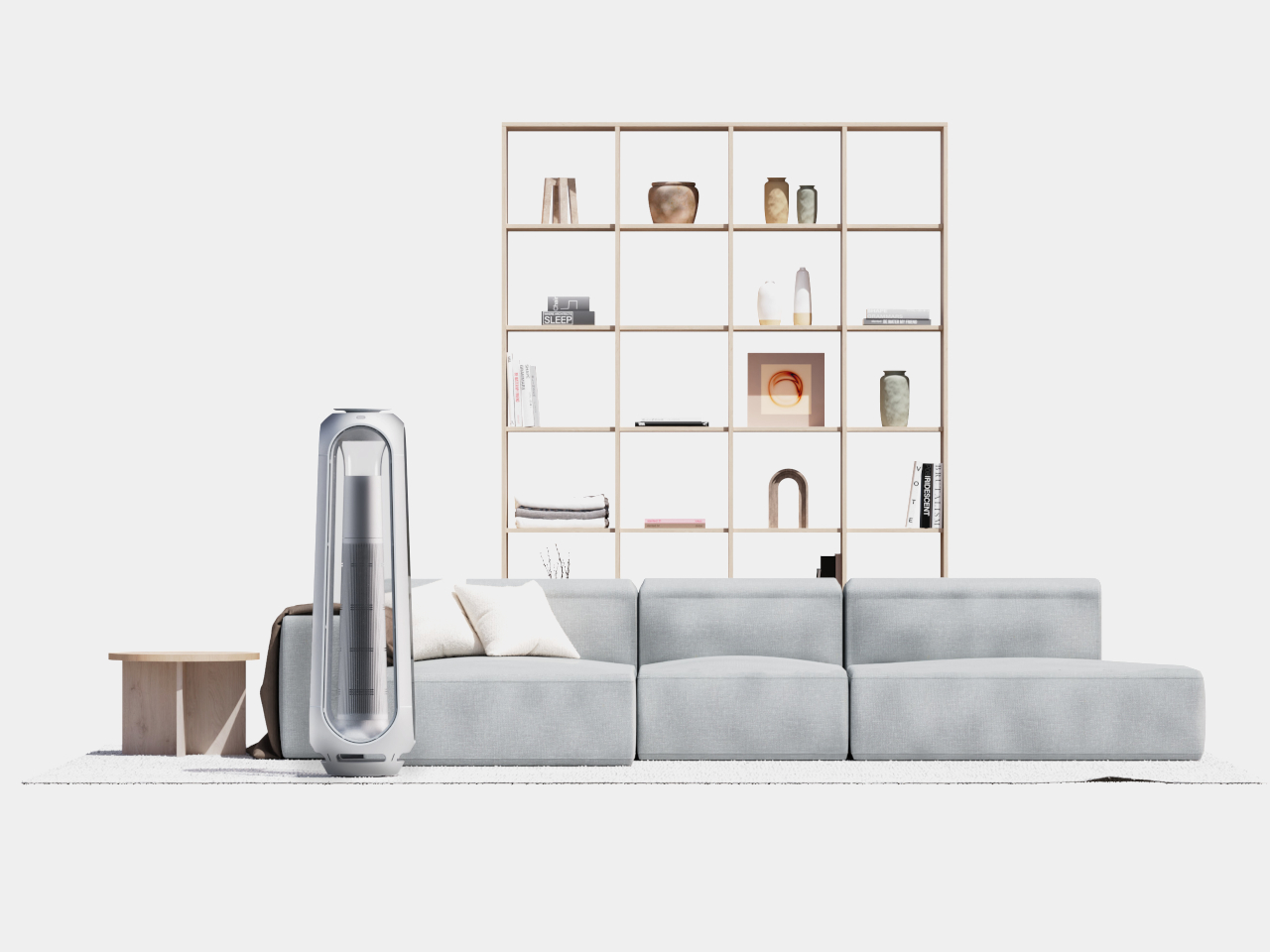

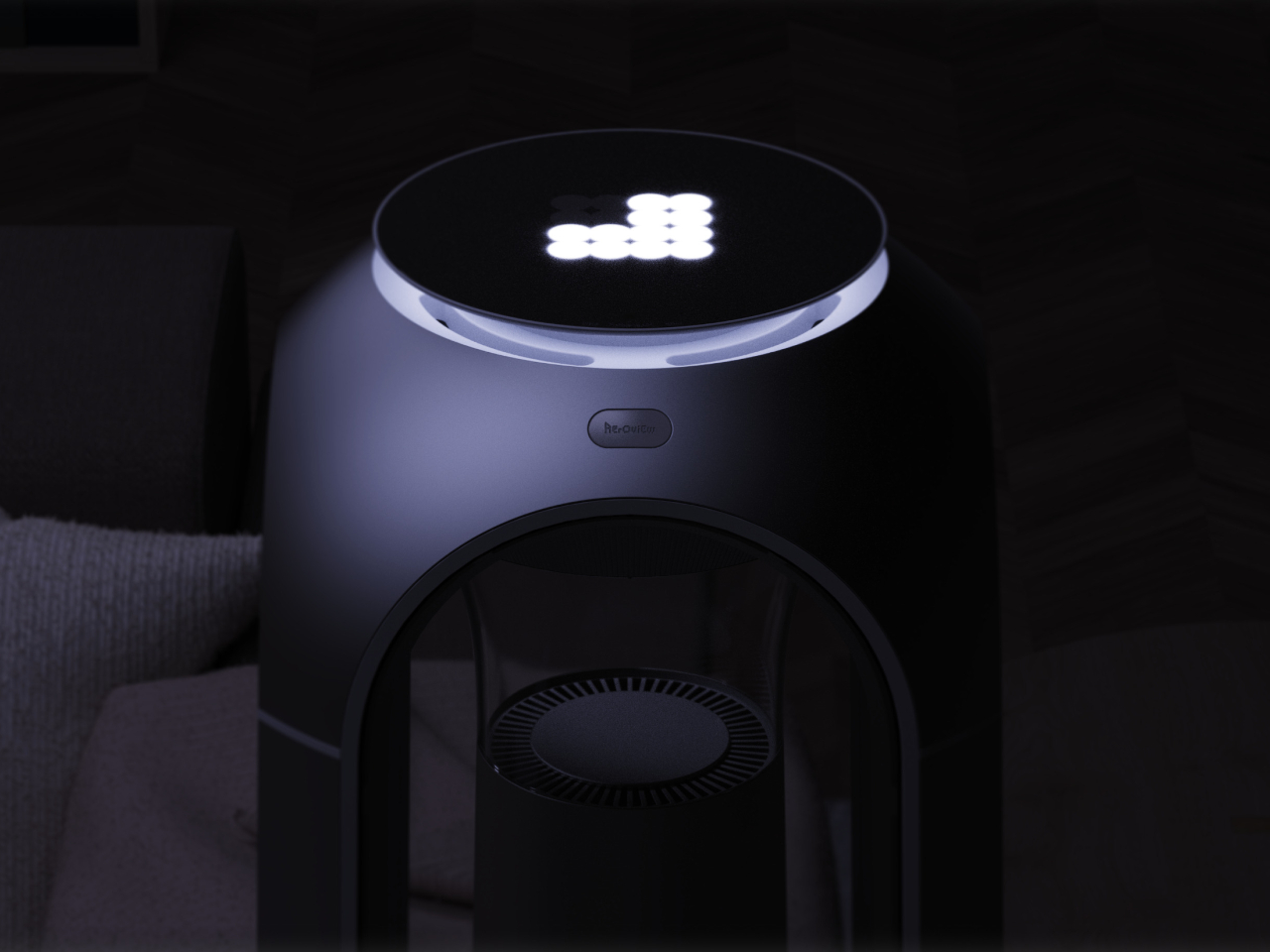
Knowing how the level of indoor pollution, or rather the volume of particular matter (PM), isn’t just a matter of interest. It can help make an air purifier more efficient by only turning it on when it’s actually needed. Many devices show the information as numbers on a display, but that often requires you to waste your time walking to the air purifier, bending down, or squinting to see the numbers.


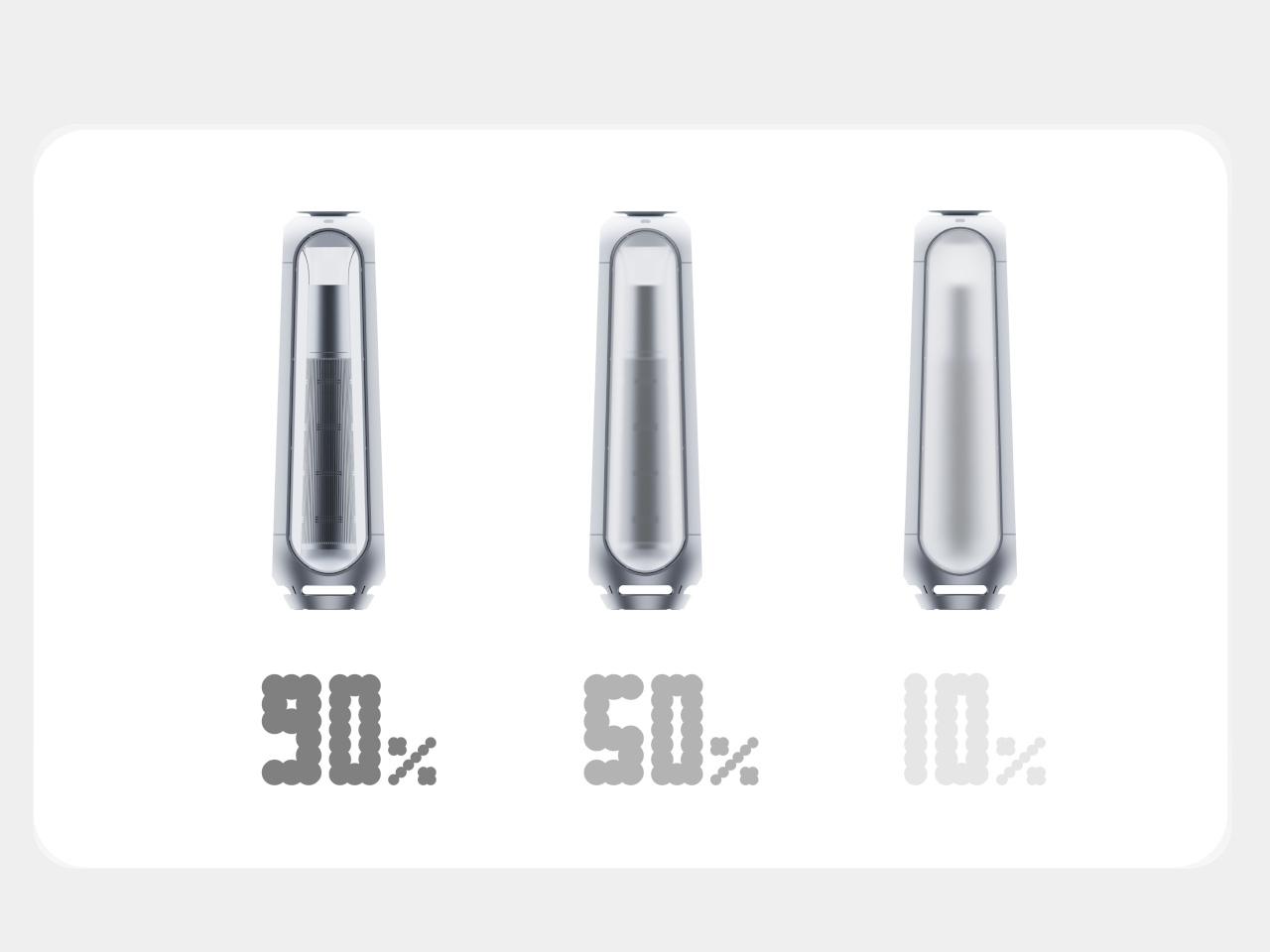
This air purifier design concept uses a more visible visual to convey the same information even from a distance. The tall tower of the appliance has transparent PDLC glass film on all four sides, and its opacity changes depending on the detected amount of fine dust and other particles in the air. It would be like watching a glass window get murky and opaque as dust starts to accumulate on its surface.
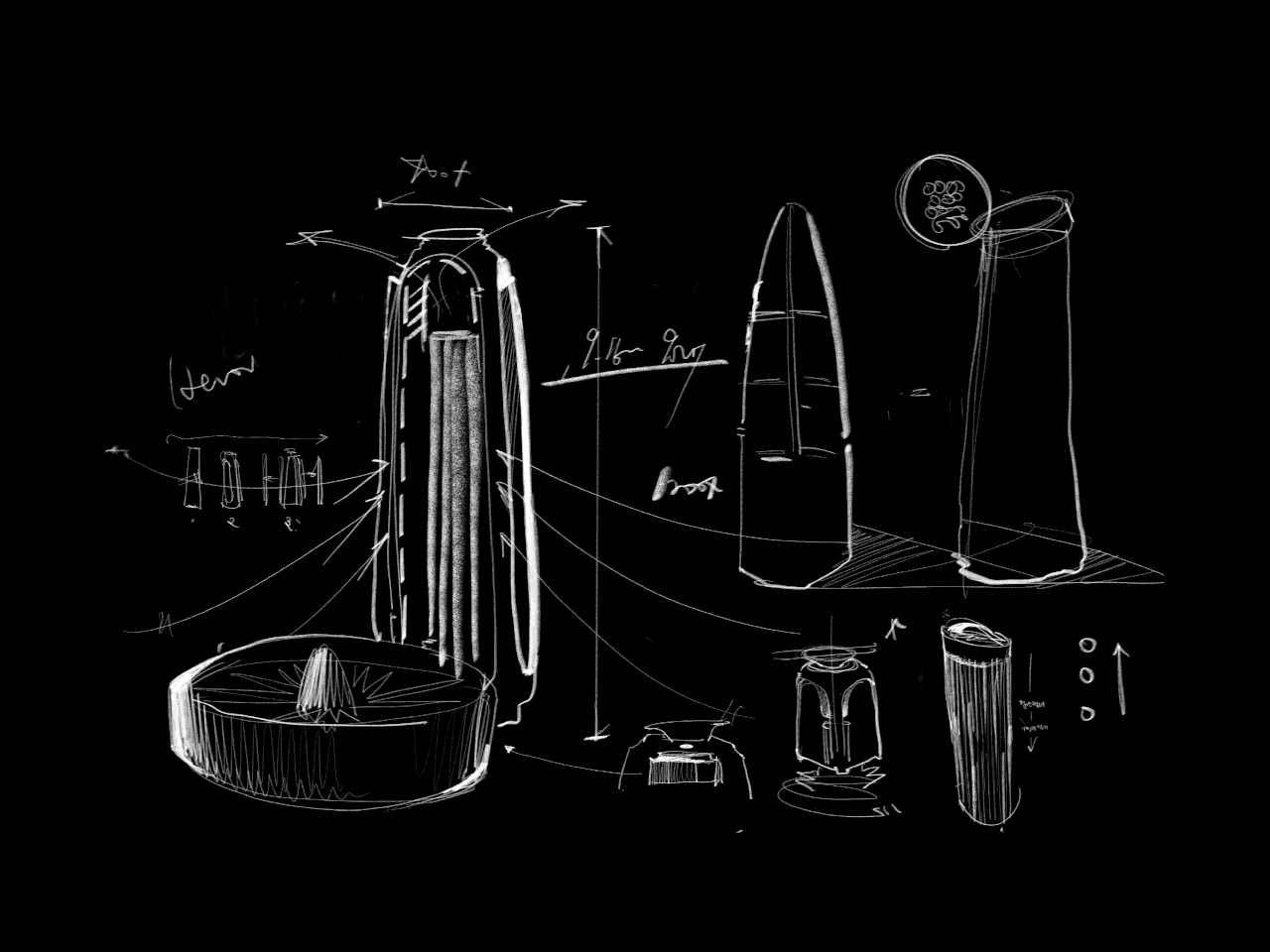
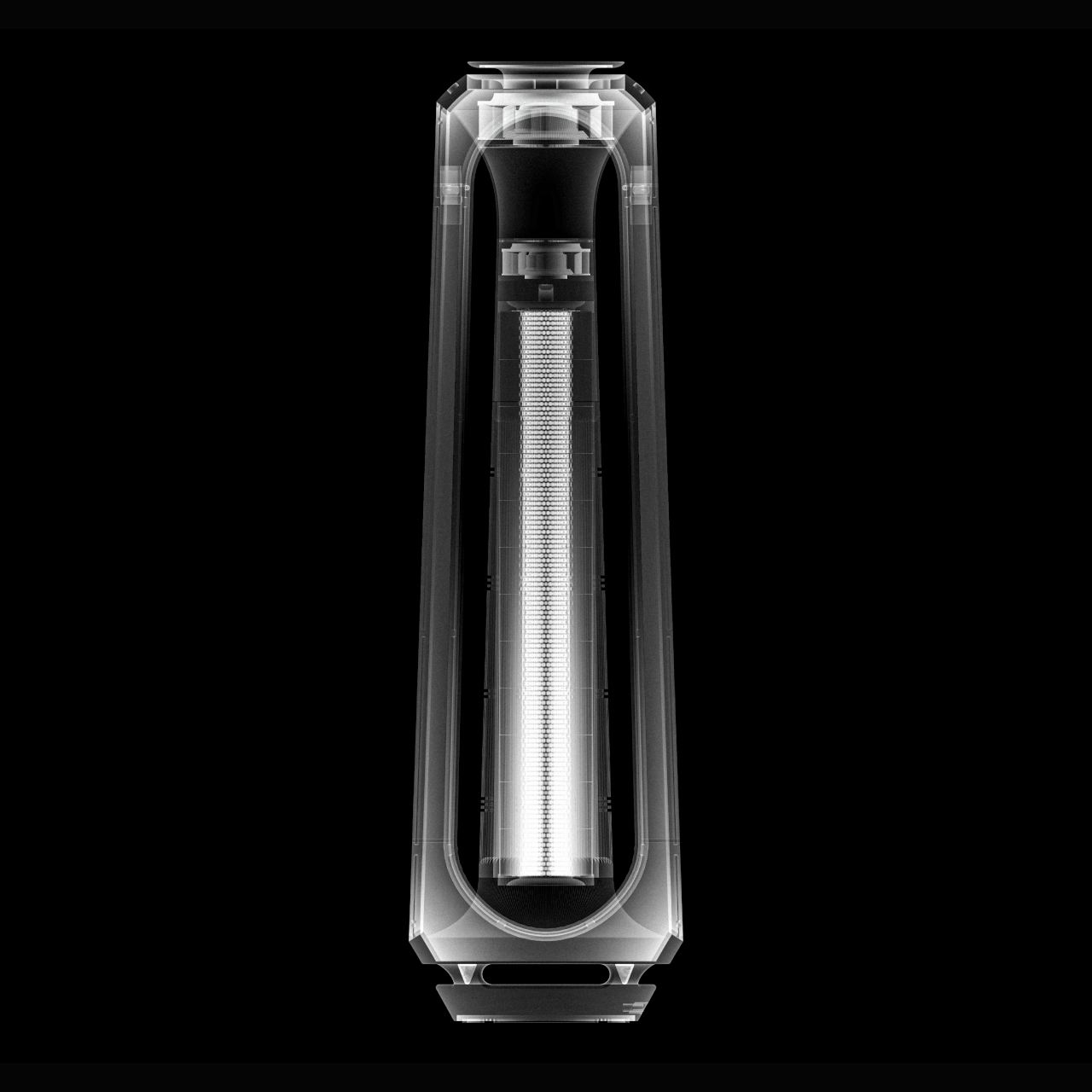
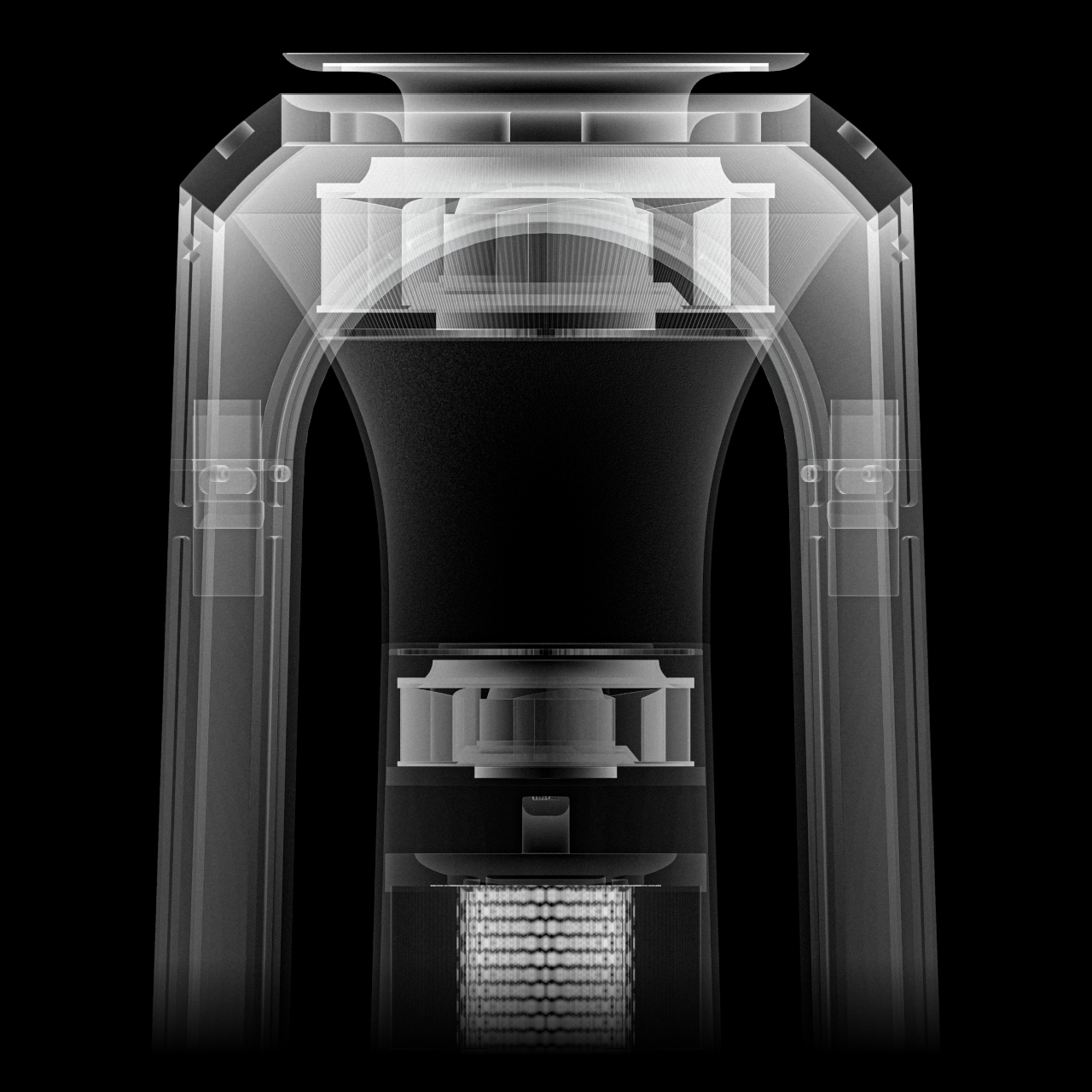
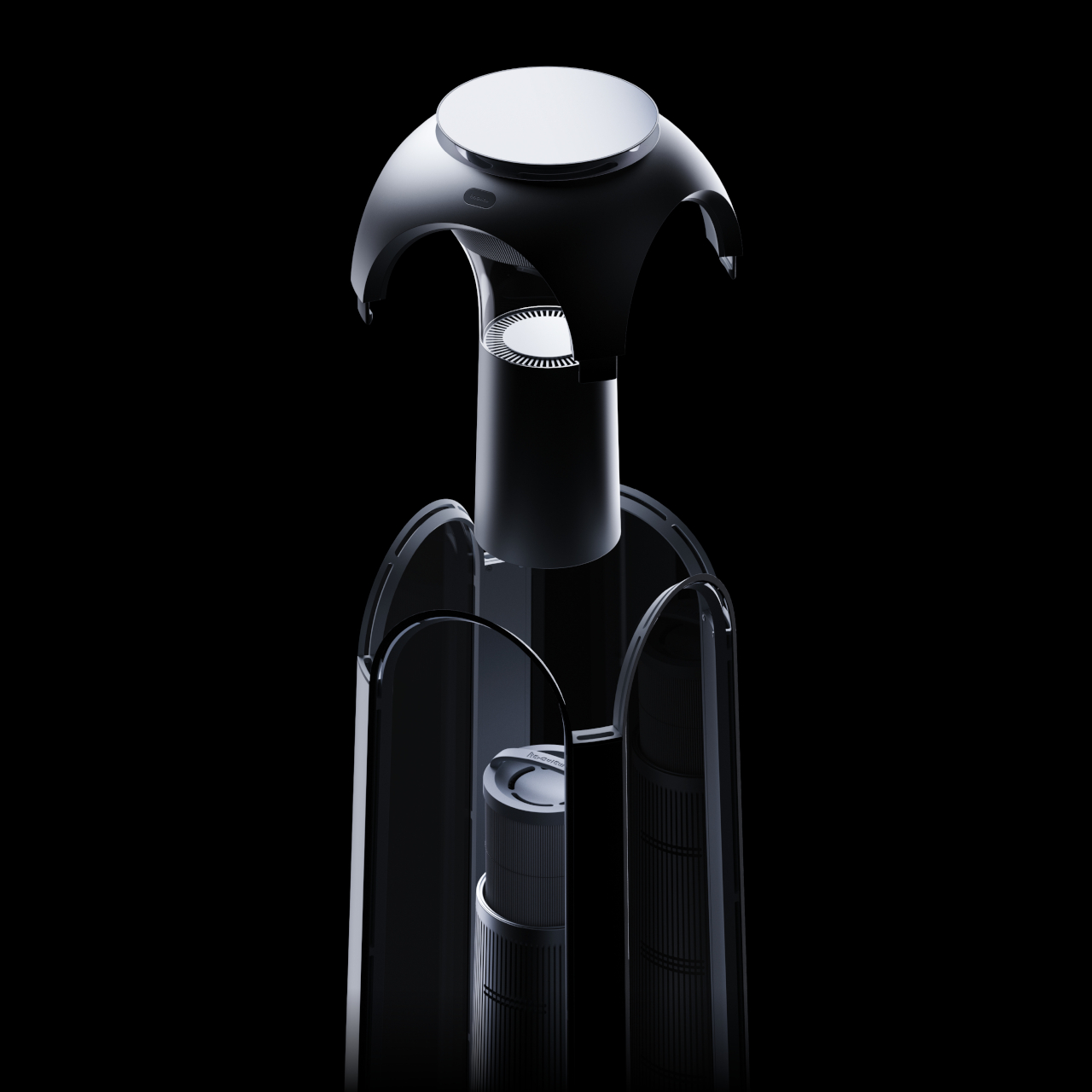
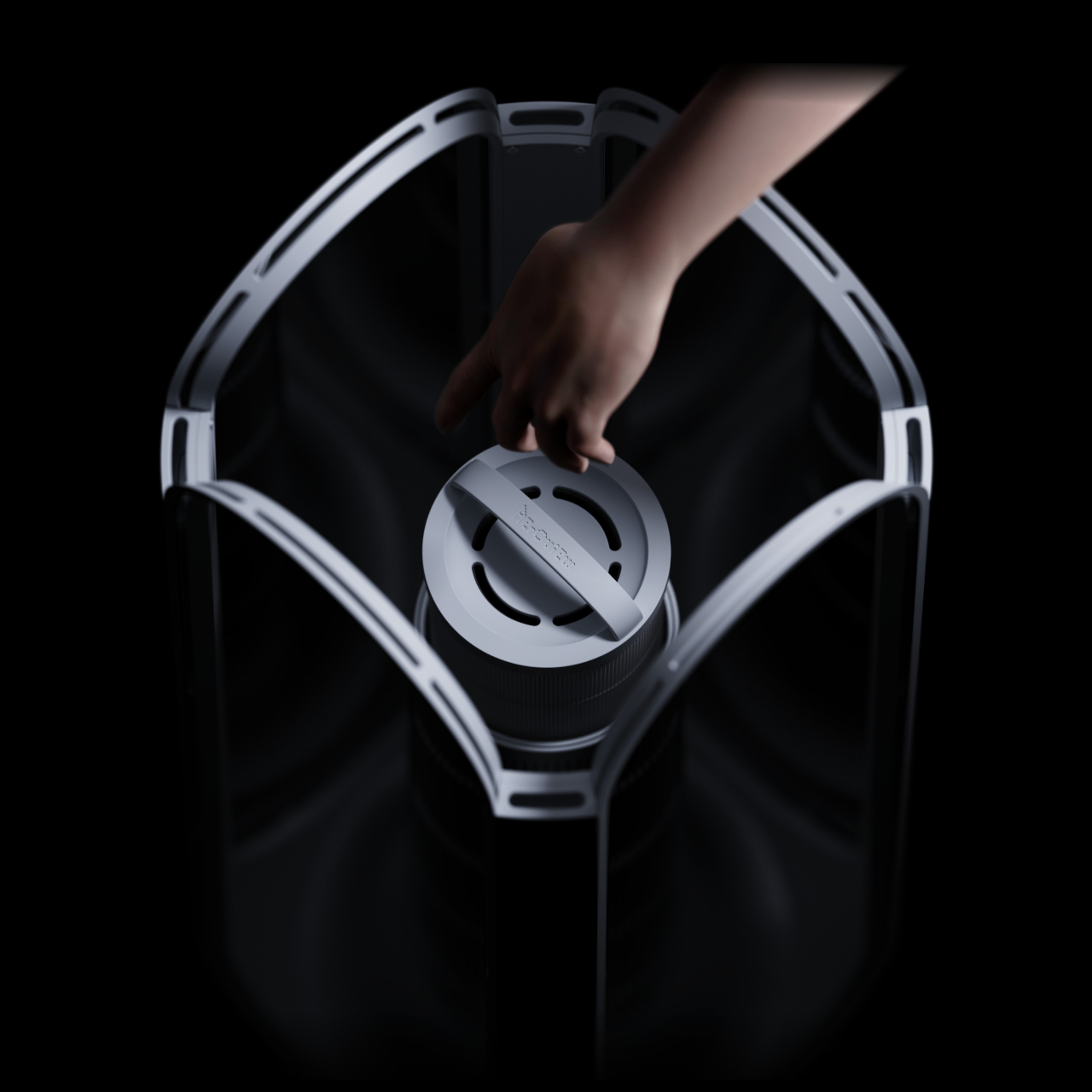
Using Aeroview is also just as easy. Simply press down on its domed top to activate the mechanism that lifts that cover and pushes the sides out, creating paths for dirty air to flow in from the side and purified air to blow from the top. The whole user experience revolves around simplicity without burying information behind multiple levels of menus, though the iconography used to convey that information does leave a bit of guesswork.

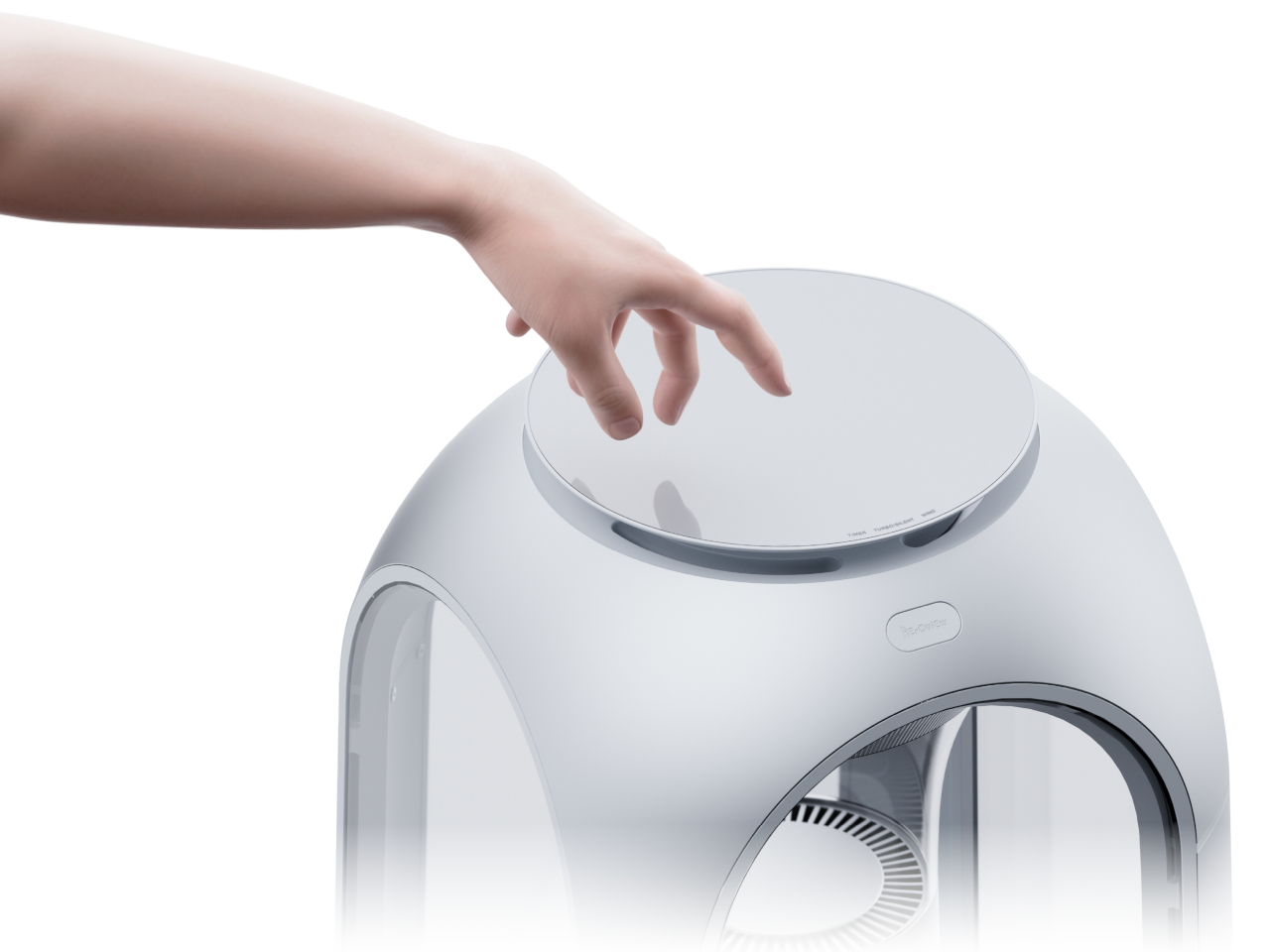
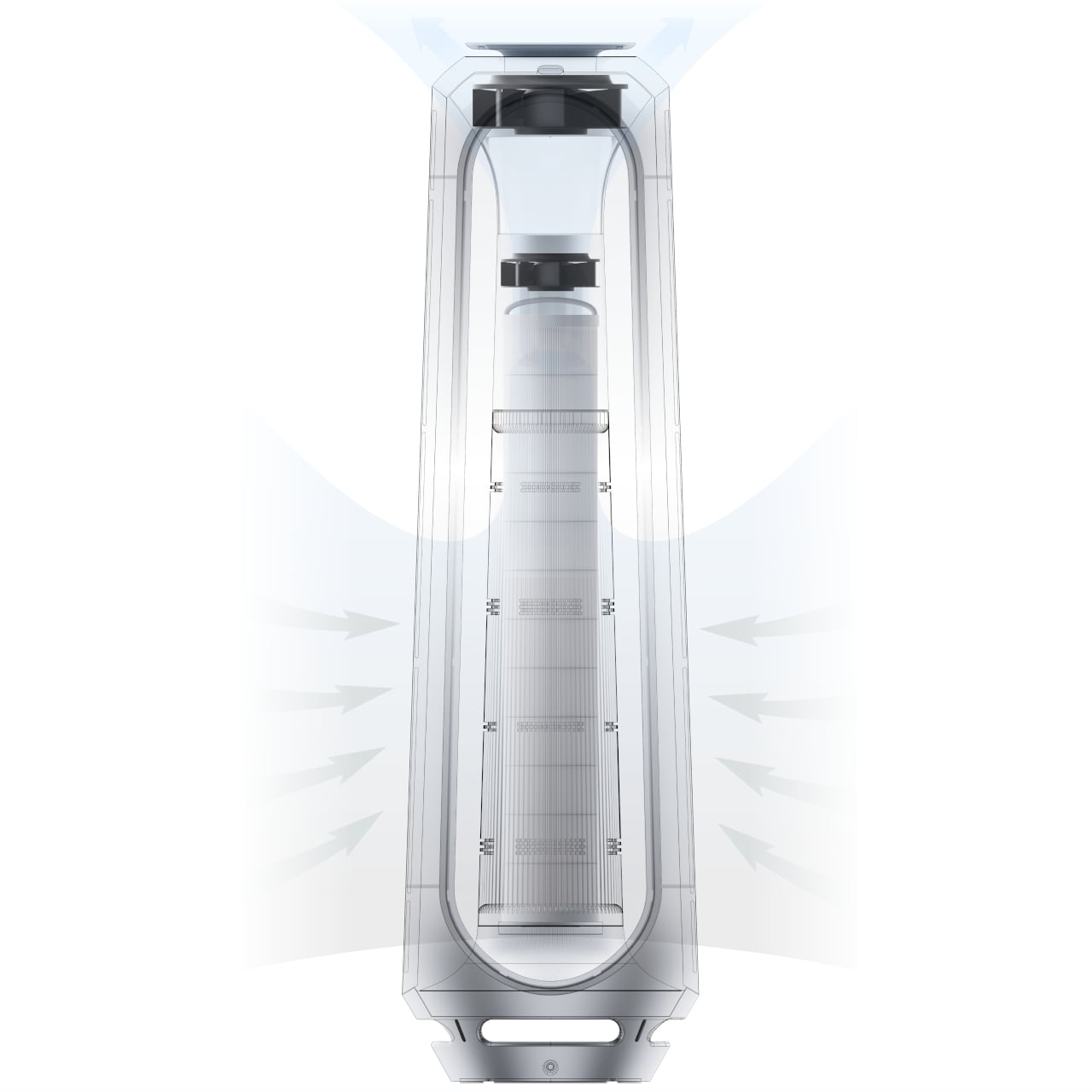
Aeroview is a fusion of stylish design and technological marvel, operating in a manner that brings some visual interest to your space. It doesn’t completely hide its identity as an air-purifying appliance, but it also uses that very same characteristic to make it look more at home in your home.
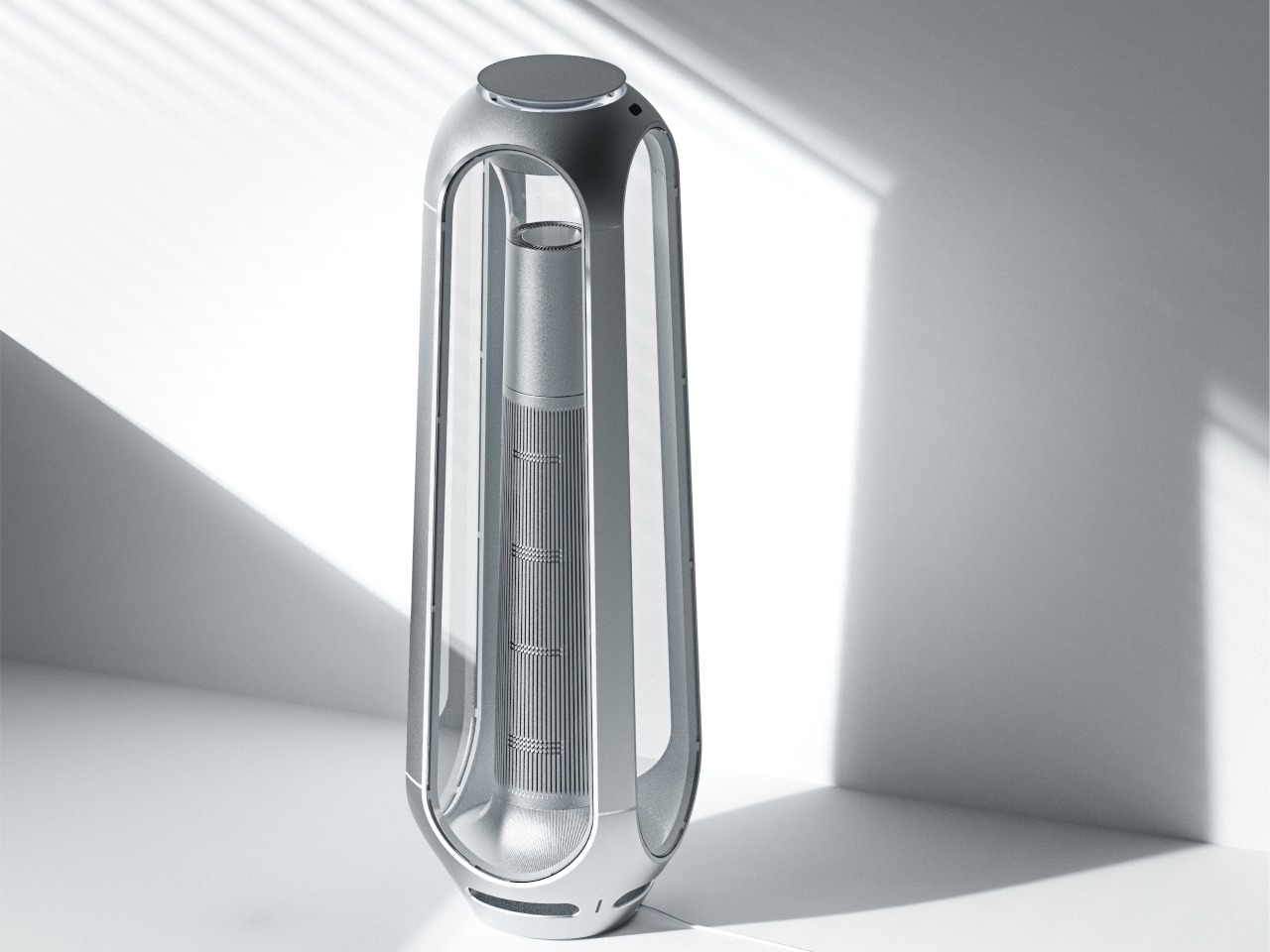
The post Air purifier concept visualizes indoor pollution for easier visibility first appeared on Yanko Design.
The new iPad Mini with A17 Pro chip brings enhanced speed, Apple Intelligence, and immersive graphics, starting at $499 and available now in multiple colors.
The post Apple’s New iPad Mini: Power and Intelligence in Your Hands first appeared on Trendy Gadget.
We're racing toward the giving time of year and what better way to treat a loved one (or even yourself) than with the gift of time and convenience. Robot mops and vacuums can all but wipe out the time you spend on a chore that often has to be taken care of. An entry-level Roomba has dropped to a price that may make that proposition even more enticing for newcomers to the robot-cleaner world.
The Y011 Roomba Combo Robot Vacuum and Mop from iRobot has dropped to $160. That’s 42 percent off the regular price of $275 and a new record low.
This unit doesn’t have some of the funkier features of pricier models, such as self-emptying or advanced object detection. But it should do a solid job of keeping your floors clean.
The Y011 cleans your space in neat rows, vacuuming and mopping in one pass. It has a low-profile design to help it slink under beds and sofas, while an edge-sweeping brush helps it pick up debris from corners and edges. The Roomba uses sensors to move around furniture and avoid tumbling down stairs. If there's a particularly dirty spot that needs extra attention, the spot cleaning feature enables the device to spin in place and keep cleaning that area for up to two minutes. On top of that, you can start an ad-hoc cleaning using Alexa or Google Assistant.
According to iRobot, this model will run for up to 120 minutes on a single charge and automatically return to its charging station when it needs more juice. The washable microfiber mop pad can be reused up to 30 times.
Meanwhile, an entry-level vacuum-only Roomba has dropped to $140, down from $250. That’s a decent deal as well, but plunking down an extra $20 for iRobot to take care of mopping as well may be a more compelling option.
Follow @EngadgetDeals on Twitter and subscribe to the Engadget Deals newsletter for the latest tech deals and buying advice.
This article originally appeared on Engadget at https://www.engadget.com/deals/irobots-entry-level-roomba-vacuum-and-mop-combo-hits-a-new-record-low-151054307.html?src=rss